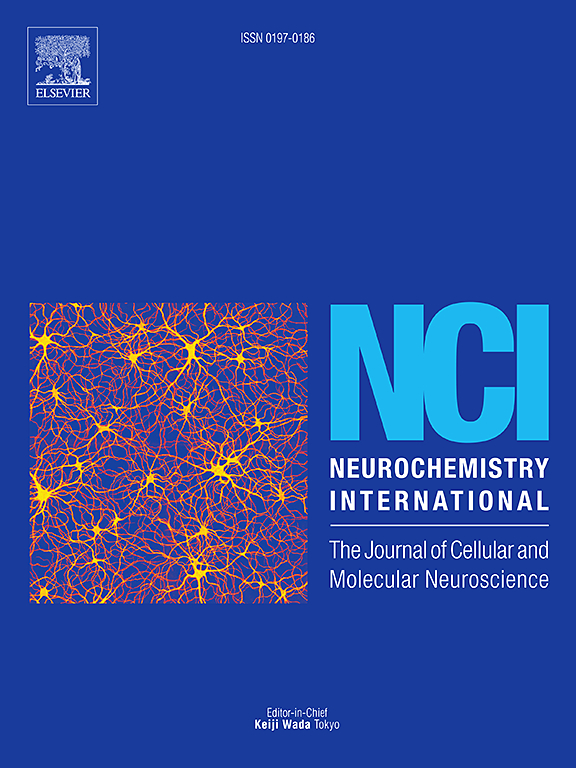Honokiol诱导的SIRT3上调可抑制皮质类药物诱发的癫痫状态的炎症过程,从而保护海马神经元。
IF 4.4
3区 医学
Q2 BIOCHEMISTRY & MOLECULAR BIOLOGY
引用次数: 0
摘要
癫痫状态(SE)是一种持续时间超过 30 分钟的连续性、自我维持性癫痫发作,是一种神经系统急症,可导致严重的脑损伤并增加癫痫的发病风险。过去几十年来,越来越多的证据表明脑部炎症在癫痫发病机制中的重要性。Honokiol(HNK)是sirtuin 3(SIRT3)的药理激活剂,是从厚朴植物的树皮或叶子中提取的一种生物活性化合物,具有预防炎症损伤发展的治疗功效。然而,HNK 通过调节与神经炎症相关的分子机制对癫痫性脑损伤的治疗效果仍不明确。因此,本研究探讨了 HNK 对皮质类固醇诱发的癫痫状态(PCSE)的影响,以及 HNK 在调节海马炎症过程中的治疗作用。在 PCSE 诱导前用 HNK 治疗可减轻行为性癫痫发作的开始。在癫痫发作开始后使用 HNK 治疗可增加 SIRT3 的表达,从而减轻 PCSE 后海马神经胶质的活化,包括反应性星形胶质细胞和活化的小胶质细胞。此外,HNK 治疗减少了核因子-κB/核苷酸结合域富含亮氨酸重复序列的含吡啶域 3 炎性体通路的激活,从而抑制了白细胞介素-1β 促炎细胞因子的产生,随后缓解了 PCSE 在海马中触发的神经元凋亡。这些结果表明,HNK 诱导的 SIRT3 上调有可能通过其抗炎特性阻止癫痫神经病理学的发展。因此,本研究表明 HNK 是一种治疗癫痫性脑损伤的天然药物。本文章由计算机程序翻译,如有差异,请以英文原文为准。
Honokiol-induced SIRT3 upregulation protects hippocampal neurons by suppressing inflammatory processes in pilocarpine-induced status epilepticus
Status epilepticus (SE), a continuous and self-sustaining epileptic seizure lasting more than 30 min, is a neurological emergency that can cause severe brain injuries and increase the risk for the development of epilepsy. Over the past few decades, accumulating evidence has suggested the importance of brain inflammation in the pathogenesis of epilepsy. Honokiol (HNK), a pharmacological activator of sirtuin 3 (SIRT3), is a bioactive compound extracted from the bark or leaves of Magnolia plants that possesses therapeutic benefits for preventing the development of inflammatory injury. However, the therapeutic effects of HNK against epileptic brain injury via regulating molecular mechanisms related to neuroinflammation remains elusive. Therefore, the present study investigated the effects of HNK on pilocarpine-induced status epilepticus (PCSE) and the therapeutic benefits of HNK in regulating inflammatory processes in the hippocampus. Treatment with HNK before PCSE induction attenuated the initiation of behavioral seizures. Post-treatment with HNK after SE onset increased SIRT3 expression, which mitigated glial activation, including reactive astrocytes and activated microglia, in the hippocampus following PCSE. Moreover, HNK treatment reduced the activation of the nuclear factor-κB/nucleotide-binding domain leucine-rich repeat with a pyrin-domain containing 3 inflammasome pathway, thereby inhibiting the production of interleukin-1β pro-inflammatory cytokine, subsequently alleviating PCSE-triggered apoptotic neuronal death in the hippocampus. These results indicate that HNK-induced SIRT3 upregulation has the potential to prevent the progression of epileptic neuropathology through its anti-inflammatory properties. Therefore, the present study suggests that HNK is a natural therapeutic agent for epileptic brain injury.
求助全文
通过发布文献求助,成功后即可免费获取论文全文。
去求助
来源期刊

Neurochemistry international
医学-神经科学
CiteScore
8.40
自引率
2.40%
发文量
128
审稿时长
37 days
期刊介绍:
Neurochemistry International is devoted to the rapid publication of outstanding original articles and timely reviews in neurochemistry. Manuscripts on a broad range of topics will be considered, including molecular and cellular neurochemistry, neuropharmacology and genetic aspects of CNS function, neuroimmunology, metabolism as well as the neurochemistry of neurological and psychiatric disorders of the CNS.
 求助内容:
求助内容: 应助结果提醒方式:
应助结果提醒方式:


